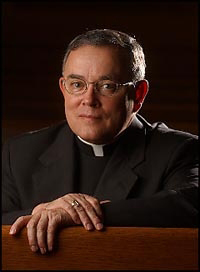The Church has many good reasons why people should believe in God, believe in Jesus Christ and believe in the beauty and urgency of her own mission. But she has only one irrefutable argument for the truth of what she teaches – the personal example of her saints.
Over this Thanksgiving weekend, or sometime during Advent, I have a homework assignment for you. I want you to rent or buy or borrow a copy of the 1966 film about Sir Thomas More, A Man for All Seasons. I want you to watch it with your family. Here’s why. More was one of the most distinguished scholars of his time, a brilliant lawyer, a gifted diplomat and a skilled political leader. Jonathan Swift, the great Anglo-Irish writer, once described him as the “person of the greatest virtue this kingdom (of England) ever produced.”
Above all, Thomas More was a man of profound Catholic faith and practice. He lived what he claimed to believe. He had his priorities in right order. He was a husband and a father first; a man who – in the words of Robert Bolt, the author of the original play and the 1966 film – “adored, and was adored, by his own large family.”
A Man for All Seasons won Oscars for both Best Picture and Best Actor, and it’s clearly one of the great stories ever brought to the screen. But it captures only a small fraction of the real man. In his daily life, Thomas More loved to laugh. He enjoyed life and every one of its gifts. Erasmus, the great Dutch humanist scholar and a friend of More and his family, described More as a man of “amiable joyousness (and) simple dress … born and framed for friendship … easy of access to all,” uninterested in ceremony and riches, humble, indifferent to food, unimpressed by opinions of the crowd, and never departing from common sense.
Despite the integrity of More’s character, and despite his faithful service, Henry VIII martyred him in 1535. More refused to accept the Tudor king’s illicit marriage to Anne Boleyn, and he refused to repudiate his fidelity to the Holy See. In 1935, the Church declared Thomas More a saint. Today – half a millennium after he died and a continent away — this one man’s faith still moves us in our own daily lives. That’s the power of sainthood. That’s the power of holiness.
Here’s the lesson I want to leave you with this week. We’re all called to martyrdom. That’s what the word martyr means: It’s the Greek word for “witness.” We may or may not ever suffer personally for our love of Jesus Christ. But we’re all called to be witnesses. In proclaiming the Year of Faith, Benedict XVI wrote that:
“By faith, across the centuries, men and women of all ages, whose names are written in the Book of Life … have confessed the beauty of following the Lord Jesus wherever they were called to bear witness to the fact that they were Christian: in the family, in the workplace, in public life, in the exercise of the charisms and ministries to which they were called.”
The only thing that matters is to be a saint. That’s what we need to be. That’s what we need to become. And if we can serve God through the witness of our lives by kindling that fire of holiness again in the heart of our local parishes and communities, then the Christ Child who comes to us at Christmas will make all things new – in our Church, in our families and in our nation.
May God grant us all a joy-filled and blessed Thanksgiving.



Yes, Amen, Come Lord Jesus! This film in our family all these years later has caused something of a cult following for St. Thomas. When my Mother died on his feast day a few years back, we took it as a confirmation for all the things he has taught us through this film and by his remarkable, heroic, obedient-to-the-Spirit life about what has been happening in our world and Church, just as in his own times. Smart and rational, generous to a fault, humble in his estimation of his place in the world, he shows us that it is not all about how to get out of doing God’s Will, but rather that “in the end then,….it is about Love.” He knew Love in its full Christian form, as giving a sacrifice, as a self-giving. He said he wouldn’t want to meet God face to face any other way.
Yes,Thanksgiving for the Saint Thomas More.